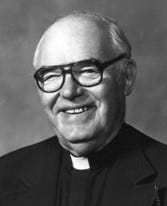Three Stages of Life: Think about the Returning Stage
Louis Putz CSC (June 1, 1909 – June 24, 1998) said there are three ages in life: the age of learning, the age of earning, and the age of returning. Louis Putz was a German-born American, an immigrant, priest, teacher,-and Visionary who learned the jocist method in France as a student studying theology and was a pioneer chaplain for the YCW, YCS, and CFM movements in the USA. He also created the Harvest House, a center devoted to Third Agers' physical, spiritual, and cultural needs, and the Forever Learning Institute —an idea for those in the third stage of life for ongoing learning and sharing of experiences.
Let’s look at those three stages through the lenses of our current times and place them in the age of learning. Let’s expand on them a tad, and maybe wherever you live, you should think about creating a Forever Learning Institute in your area.
Learning Age
The first age of life primarily focuses on acquiring knowledge, skills, and understanding of the world. This period typically extends from childhood through early adulthood and is characterized by the following:
Formal Education: School, college, and specialized training that builds foundational knowledge
Personal Development: Formation of values, personality, and worldview
Skill Acquisition: Learning basic life skills and professional capabilities
Experimentation: Trying different activities and interests to discover one's passion
Mentorship Reception: Being guided by teachers, parents, and other role models
Key Questions:
What am I passionate about?
How can I prepare myself for future opportunities?
Earning Age
The second age involves applying acquired knowledge to create value and build financial security. This typically occupies much of one's adult life and involves:
Career Development: Building professional expertise and advancing in the chosen field
Wealth Creation: Generating income, saving, and investing for the future
Family Building: For many, starting and providing for a family
Asset Accumulation: Acquiring property, investments, and other resources
Professional Achievement: Reaching career milestones and gaining recognition
Key Questions:
How can I align my career with my values and goals?
What impact do I want to make through my work?
Returning Age
The final age centers on giving back to society and sharing wisdom with future generations. This age often begins in the later years of one's career and continues through retirement.
Mentorship: Guiding younger individuals in their personal and professional journeys
Knowledge Sharing: Teaching, writing, or speaking to share accumulated wisdom
Philanthropy: Contributing resources to causes and communities
Legacy Building: Creating lasting positive impact through various initiatives
Community Service: Volunteering and supporting social causes
Key Questions:
How can I use my resources and skills to benefit others?
What legacy do I want to leave behind?
The Interconnected Nature of the Age
While presented as distinct phases, these age often overlap and interact:
Learning continues throughout life, even during the earning and returning phases
Early earning experiences may occur during the learning age
Returning can begin while still in the earning phase
Each age builds upon and enriches the others
Modern Evolution of the Three Age
In today's rapidly changing world, these ages have become more fluid:
Technology enables continuous learning at any age
Career changes and pivots are more common
Remote work and digital platforms create new earning opportunities
Social media and online platforms facilitate earlier knowledge-sharing
Gap years and sabbaticals allow for age intermixing
The key is to view these ages as flexible guidelines rather than rigid boundaries for a purposeful life journey. Each contributes to personal fulfillment and societal progress. Consider synchronicity in this context.
Key Takeaways:
These ages are not strictly linear; one can learn, earn, and return simultaneously at different points in life.
The framework emphasizes balance—financial success (earning) should complement personal growth (learning) and altruism (returning).
Reflecting on these pages can help you live more intentionally and meaningfully.
Louis Putz believed that “service adds years to your life and life to your years” and that “isolation is the greatest malady of older adults.”
Louis Putz laid the foundation for his vision of a “school” for seniors where students could come together for the pure joy of learning, for interaction with each other, and their own ongoing personal and spiritual development. Additionally, this school would have well-qualified teachers who would serve without pay. Thus, on 24 May 1974, he assembled his first advisory group to flesh out the school's mission, goals, and structure. The school in South Bend has grown to a point where it averages over 2,500 students, in-person classes and events, trips, field trip learning experiences, and Zoom classes.
The South Bend Institute has a full-time director and staff, and many professors from local colleges teach because they love learning and interacting with adults. The students range in age from 50 and up, which is young by today's standards.
So, in 2025, wherever you are on this planet, think about creating a Forever Learning Institute in your area, expanding a church's educational needs, and helping grow the JOCIST movement.



Thank you for this reflection, Richard. I agree with your observation that the three ages are not meant to be separate and distinct. Indeed, I recall teenagers commenting on the value of learning how to serve others while still in school. It is the norm for Catholic secondary schools in my part of the world (Western Australia) to run a Christian Service Learning program that has students (12 to 17 years old) engaging with their communities in acts of service. I look forward to reading your reflections on the work of Fr Louis Pütz CSC.